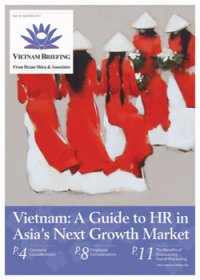Vietnam’s Minimum Wage Increases
HANOI – The Vietnamese government has issued a decree to increase the country’s minimum salary by between VND250,000-VND400,000 (US$12-$19) starting January 1, 2015. This will bring the wage floor to between VND2.15 million-VND3.1 million ($101.4-$146.2) depending on the region.
 RELATED: Dezan Shira & Associates’ Payroll and Human Resources Services
RELATED: Dezan Shira & Associates’ Payroll and Human Resources Services
The minimum wage will be highest in Region One, which includes urban Hanoi, Hai Phong, and Ho Chi Minh City. The lowest minimum wages will be in Region Four which includes the least developed parts of Vietnam. Regions Two and Three consist of places of intermediate development and thus have intermediate minimum wages.
These increases mean that Vietnam’s minimum wage will have increased 17-fold from 15 years ago to go along with rapid economic growth in the same period. However, these increases could drive away business, and foreign investors have urged caution and deliberation from the Vietnamese government before further wage increases are made.
The supporters of the rise in minimum wage say that it will alleviate poverty and improve the quality of life for low-wage workers. Vietnam’s income and social inequality have been increasing with economic growth so this may be an attempt to keep more growth in the lower classes of society.
RELATED: Minimum Wage Developments Across Emerging Asia
However, the increases may not accomplish their goal if they result in price increases exceeding CPI growth. In 2011, inflation reached a 29-month high of 19.8 percent in May which led to widespread strikes across the country. These strikes dented but didn’t stop Vietnam’s goal of attracting foreign investors to set up manufacturing hubs as wages increase in China.
Recent surveys have indicated that up to 13 percent of workers say their salaries do not cover basic living costs, 25 percent say they have had to spend carefully and 50 percent have said their salary only affords a basic standard of living. Spending on basic needs has outgrown the minimum wage and the current rate only covers 70-74 percent of minimum living costs.
The rise in wages should give workers more leverage in wage negotiations even though many companies already pay local workers more than the minimum wage. This could affect Vietnam’s thriving industries, such as the information technology and sewing sectors, which receive large orders and investments from abroad.
Many companies are looking to see if the Vietnamese government can manage inflation and wage pressures and, if Vietnam mismanages it, multinationals will have other alternatives in Southeast Asia. The increase in minimum wage reflects the drive for equitable growth but it will require the Vietnamese government to maintain the right balance to keep companies investing in Vietnam.
Asia Briefing Ltd. is a subsidiary of Dezan Shira & Associates. Dezan Shira is a specialist foreign direct investment practice, providing corporate establishment, business advisory, tax advisory and compliance, accounting, payroll, due diligence and financial review services to multinationals investing in China, Hong Kong, India, Vietnam, Singapore and the rest of ASEAN. For further information, please email vietnam@dezshira.com or visit www.dezshira.com.
Stay up to date with the latest business and investment trends in Asia by subscribing to our complimentary update service featuring news, commentary and regulatory insight.
Related Reading
 Vietnam: A Guide to HR in Asia’s Next Growth Market
Vietnam: A Guide to HR in Asia’s Next Growth Market
In this issue of Vietnam Briefing, we attempt to clarify human resources (HR) and payroll processes in Vietnam. We first take you through the current trends affecting the HR landscape and then we delve into the process of hiring and paying your employees. We next look at what specific obligations an employer has to their employees. Additionally, we guide you through the often complex system of visas, work permits, and temporary residence cards. Finally, we highlight the benefits of outsourcing your payroll to a “pan-Asia” vendor.
 Tax, Accounting, and Audit in Vietnam 2014-2015
Tax, Accounting, and Audit in Vietnam 2014-2015
The first edition of Tax, Accounting, and Audit in Vietnam, published in 2014, offers a comprehensive overview of the major taxes foreign investors are likely to encounter when establishing or operating a business in Vietnam, as well as other tax-relevant obligations. This concise, detailed, yet pragmatic guide is ideal for CFOs, compliance officers and heads of accounting who need to be able to navigate the complex tax and accounting landscape in Vietnam in order to effectively manage and strategically plan their Vietnam operations.
 An Introduction to Doing Business in Vietnam 2014 (Second Edition)
An Introduction to Doing Business in Vietnam 2014 (Second Edition)
An Introduction to Doing Business in Vietnam 2014 (Second Edition) provides readers with an overview of the fundamentals of investing and conducting business in Vietnam. Compiled by Dezan Shira & Associates, a specialist foreign direct investment practice, this guide explains the basics of company establishment, annual compliance, taxation, human resources, payroll, and social insurance in the country.
- Previous Article Vietnam Consumer Confidence On The Rise
- Next Article Vietnam Manufacturing Output Rises for 14th Month









